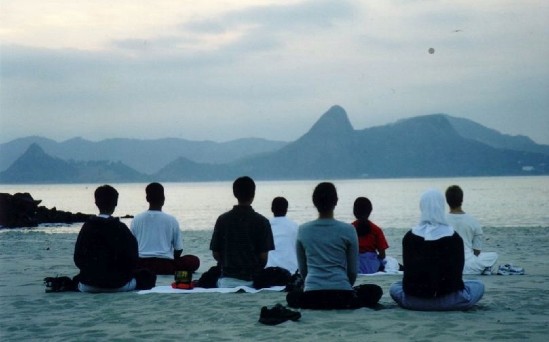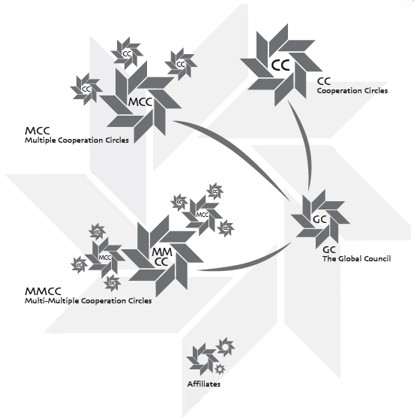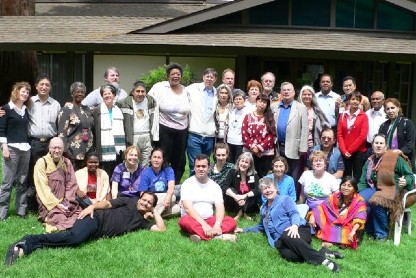Why and How to Join the United Religions Initiative
A presentation for NAIN Connect 2006 in Vancouver, British Columbia, Canada: Learn the steps for a new or existing group or organization to become a member of the United Religions Initiative (URI).
Please review the current URI website as some details may have changed over the years.
Purpose of the URI
“The purpose of the United Religions Initiative is to promote enduring, daily interfaith cooperation, to end religiously motivated violence and to create cultures of peace, justice and healing for the Earth and all living beings.”
A Brief History of the URI
- Motivated by interfaith prayers at United Nations 50th anniversary
- Vision of Bishop William Swing: a United Religions as spiritual peer of the U.N., bringing together religious leaders to heal religious and social conflicts
- Leaders said: “come back when it works.”
- Grassroots movement emerges to support vision of interfaith cooperation for peace and justice
- ‘96 – ‘00 – Assemblies and Summits held around the world
- Y2K –URI-inspired 200+ “72 Hours of Peace” events held in 50 countries
- After 4 years of listening, deliberation, and chaotic creativity, URI Charter completed and signed June 2000
- Today, URI members come from more than 50 countries, 100 religions, spiritual expressions and indigenous traditions

Participants in 2002 Global Assembly, Rio, meditating together
Why New Groups Form
- Inspired by the Preamble, Purpose, Principles of the Charter
- Charter provides framework for dialogue and action – empowering development of local solutions
- Not the only methodology, but swift growth internationally proves URI as potent galvanizer of interfaith cooperation
Why Existing Groups Join
- Connect with global interfaith network
- Support collective interfaith action internationally
- International Day of Peace
- Contribute to relief work in places like Malawi (famine) and Pakistan (earthquake)
- Learn from experiences of similar groups – and share own for others to learn from

In October 2005, 7.8 earthquake in Pakistani-adminstered Kashmir, estimated 90,000+ dead URI Circles around the world donated supplies and funds for relief work. This work was coordinated by the URI MCC Pakistan
Membership in the URI
- Categories of membership in the URI:
- Cooperation Circles (CC)
- Multi Cooperation Circles (MCC)
- Multi-Multi Cooperation Circles (MMCC)
- Affiliates
- Membership supported by international, democratically Global Council and professional Global Support Staff

Overview of Membership
- Cooperation Circles (CC) are the fundamental unit of the URI. Individuals, or organizations who seek membership in the URI create CCs and take on the rights and responsibilities of membership.
- In a Multiple Cooperation Circle (MCC), three or more CCs join together to create a more enduring organizing structure.
- Two or more MCCs wishing to coordinate their efforts may form a Multi-Multiple Cooperation Circle (MMCC)
- Affiliates are individuals, associations and organizations who pledge their support of the URI Charter but who do not choose to form a Circle. Affiliates give their support and resources to the URI.

Regional leaders from the Australia, Cambodia, Indonesia, Malaysia, New Zealand, and the Philippines gather in 2005
Cooperation Circles (CC)
- To qualify as a CC, a group must have 7 or more individuals, representing at least 3 religions, spiritual expressions, and indigenous traditions.
- As a grassroots organization, URI Circles determine their own agendas, membership requirements, decision-making models – consistent with the URI Charter.
Rights of Members
Each URI Circle has the right:
- to organize in any manner and around any issue or activity which is relevant to and consistent with the Preamble, Purpose and Principles.
- to determine its own process of governance and decision-making that is in accordance with the Preamble, Purpose and Principles.
- to participate in the selection of Trustees to serve on the Global Council.
- to use the name “United Religions Initiative” and its related names, abbreviations, logos, and images— provided that they are used in furtherance of and in accordance with the Preamble, Purpose and Principles of the URI.
- to choose to combine with or join any other URI Circles.
- to review and accept, on behalf of the URI, applications for Affiliate membership from individuals, organizations and associations seeking to join in pursuit of the Purpose.

Two Houston, Texas CCs participated with 20 other organizations for A Day of Collaboration to Produce a Year of Inspired Results and Connectedness. The poster above presents the answers to the day’s central question, “what do we hope to achieve?”
Responsibilities of Members
Each URI Circle accepts the responsibility:
- to act in accordance with the Preamble, Purpose and Principles;
- to determine its own process of governance and decision-making that is in accordance with the Preamble, Purpose and Principles;
- to take actions to encourage and ensure that its own members act in accordance with the Preamble, Purpose and Principles;
- to adhere to the by-laws and operating procedures as they evolve in the life of URI;
- to communicate best practices and stories and highlights of activities with other parts of URI;
- to develop financial and other resources to meet its own needs;
- to share financial and other resources to help meet the needs of other Circles;
- to actively use its best efforts to achieve the Purpose in accordance with the Principles;
- to pay any dues and/or offer such appropriate contribution as the Global Council may establish;
- to keep accurate and current records of its members, financial transactions and activities;
- to indemnify and hold the Trustees, United Religions Initiative, its employees and representatives, harmless from any liabilities arising out of or in any way caused by a URI Circle’s breach of any provision of the Articles, by-laws or operating procedures.
Application for Membership
- Cooperation Circles
- Individuals, associations, and organizations may form their own Cooperation Circle by applying for membership directly to the Global Council.
- Applicants are interviewed by a member of the Global Support Staff and/or Global Council.
- Affiliates
- Affiliates may be asked to pay a fee and/or offer such appropriate contribution as the Global Council may establish in order to participate in URI activities and the communication network.
- Affiliates may apply to the Global Council or to URI Cooperation Circles.

Members of the URI Global Council and staff meeting near San Francisco, CA, in May 2006.
For more information, visit the URI website at www.uri.org.
Sources
All photos were freely shared with the author through URI-related mailing lists.
Content sourced from
- URI Charter
- Author’s field notes as a participant in URI conferences, conference calls, and e-mail discussions
- Bishop William E. Swing, The Coming United Religions, CoNexus Press: 1998.